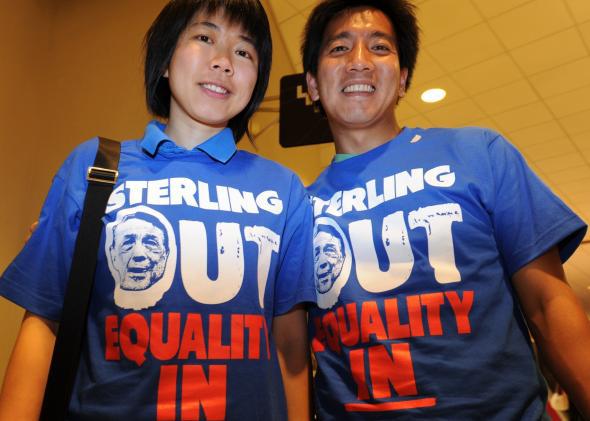Somehow, I doubt that anyone is sitting down today to draft an open letter in defense of Donald Sterling, the rightfully sanctioned, frightfully racist owner of the L.A. Clippers. But a number of those who signed this one (which, I should note, quotes me out-of-context and without citation) last week on behalf of Mozilla’s ousted CEO Brendan Eich have rushed to the Web in the past few days to say, “No, no, no, don’t even think about it: Sterling =/= Eich.” Apparently, they, too, realized that after the Eich display, it would be only natural to expect similar hand-wringing over Sterling. But that wouldn’t do, because while homophobia (however politely disguised) is still legitimate in their minds, racism is out of the question.
Of course, some of us are less interested in nitpicking the differences between racists and homophobes; John Aravosis has already articulated the similarity of these situations ably, and I won’t repeat his arguments here. What I will add, though, are some observations on the logic that writers like Andrew Sullivan and my Slate colleague William Saletan have been using in insisting that one can rationally condemn Sterling while bemoaning the fate of Eich as a sign of the end times.
As they and others point out, even before these recordings were revealed, Sterling was widely known to be an unrepentant racist, most notably for grossly discriminatory housing practices as a Los Angeles landlord that surfaced back in 2003. Indeed, as my colleague Jamelle Bouie has suggested, the more recent expressions of hatred are fairly innocuous in comparison to the direct damage of much of Sterling’s previous behavior. Eich’s one-time contribution to the Prop 8 campaign would indeed seem less egregious when held against Sterling’s lengthy rap sheet of bigotry, an exercise Saletan completed in a recent post.
But does that type of tally-the-hate comparison actually mean anything? When you think about it, the implications of such a metric are troublesome—how do we determine the number of offenses at which point a person passes from tsk-tsk to terrible? The only way out, it seems, is to make some pretty subjective determinations regarding what counts as truly and obviously bigoted as contrasted with reasonable disagreements of opinion. Of course, Sullivan and Saletan are both on the record as believing it is possible to reject gay marriage without being bigoted, and while I doubt I can convince them otherwise, I think it’s worth pointing out a few problems with their model of “what counts” as condemnable hate.
Sullivan has written that “if Brendan Eich had made comments telling his friends to keep away from faggots, if he’d used any such terminology or had ever been shown to have discriminated against gays in the workplace or in his daily interactions, then his case would be very similar [to Sterling’s]. But no such comments are in the public or private record, and there’s zero evidence that he ever acted in the workplace to harm gay employees.” Think about how high that bar actually is, especially in a progressive enclave like Silicon Valley. For Sullivan, faggot has to be in the subject line of a Monday memo or otherwise bandied about in public to truly justify outrage. But what major executive in his right mind, even if he couldn’t stand the sight of the faggiest faggot at 50 yards, is going to be stupid enough to express that kind of backwoods ignorance out loud? Likewise, Saletan quotes many employees at Mozilla who say Eich never said or did anything that felt outwardly homophobic. But what does this actually tell us—that he was one of these hypothetical creatures who can despise gay marriage without possessing a smidgeon of anti-gay animus, or that he had the basic intelligence to keep his retrograde opinions to himself in a business setting?
The latter seems more likely, and it’s really not all that impressive. After all, most gay people only infrequently have occasion to foreground their gayness in the workplace; it’s unlikely that Eich or any other quietly anti-gay executive would be afforded the opportunity to slip up all that often—let HR handle benefits questions and there’s little other contact necessary. Plus, it’s no great feat to walk by a photo of someone’s partner on his desk without offering your hateful opinion, is it?
No, like racism, homophobia is quickly becoming the kind of thing that people with functioning impulse control know to keep to themselves; and thus, like racism, it manifests itself in institutions and other social structures far more often than in the kind of lurid, soap opera encounters about which Sullivan and Saletan fantasize. Indeed, while I can’t speak for everyone, I hazard that most gays are pretty good at handling the increasingly rare off-color office comment at this point—I know I’m not fazed by that kind of thing. What pisses me off nowadays is the coward who thinks he can get away with screwing with my life behind my back, whether in a voting booth or elsewhere. I am less offended by the person who tries to gay-bash me directly than by the person who smiles at me in the elevator on their way to vote against my well-being, reasonable reasons be damned.
So is Eich as bad as Sterling? In emotional intensity or coarseness of viewpoint, perhaps not. But in his lack of respect for and functional impact on the lives of my queer brothers and sisters? Sorry, but I can’t see much difference.
